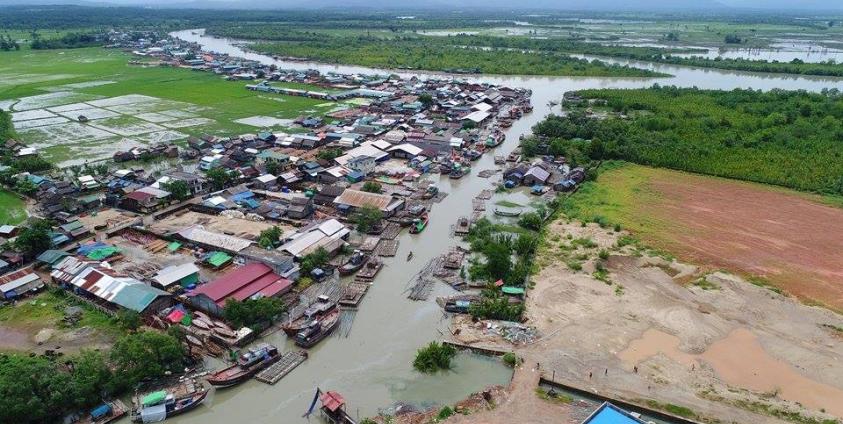At the National League for Democracy’s (NLD) central committee meeting held on September 21 and 22 of this year, a decision was made to form an Ethnic Affairs Committee as part of a strategic response to the upcoming 2020 election.
NLD Vice-Chair, Dr. Zaw Myint Maung at a press conference said “local ethnic parties no longer compete with each other. They now collaborate. Therefore, our central committee team needs to have a strategic plan to overcome this challenge by forming an ethnic affairs committee with real ethics.”
It is noteworthy the NLD views ethnic parties increasing shift towards forming alliances as a ‘challenge’. The meaning is fairly clear, they NLD envisions a potential loss of ethnic community member votes in 2020, given this political development. One counter to that possibility has been the establishment of a ethnic affairs committee as Dr. Maung noted.
However, the electoral landscape is very different as 2020 approaches compared to 2015. New changes bring new challenges.
One important change has been the October 23, 2019 Union Election Commission’s amendments to the electoral by-laws of Pyithu Hluttaw [the House of Representatives].
One of the drafted changes to section 10 of the electoral by-laws included a provision allowing domestic migrant workers the ability to vote in the regions where they work, provided they have a minimum of 3-months residency in the same voting location. Previously, the election by-law required 6-months residency in a voting region before being eligible to exercise voting rights.
However, some ethnic group leaders view this change as a threat. “Allowing migrant workers who have temporal residence, rights to vote could bring a negative impact on the sustainability of the ethnic political parties and the representation of ethnics,” noted Dr. Aung Naing Oo, Chaungzon Township Constituency (1), State Hluttaw representative cum Vice-Chairperson of Mon State Hluttaw.
According to Dr. Aung Naing Oo, “…allowing temporary residents [voting rights] in a place where they work will disadvantage local ethnic people. It seems unfair for permanent residents, who have been living in the area for so long.”
Although, Dr. Aung Naing Oo in advancing his argument against the amendment urged stakeholders to consider the essence of democracy, it is important to point out the previous standard still enabled migrant workers their voting rights -it just required this group of Myanmar’s electorate to have 6- months local residency, rather than 3-months.
U Win Maw Oo, Secretary of Mon State, and with the Union Solidarity and Development Party (USDP) also argues against the by law change. “These internal migrant workers are not native to Mon State, so their interests to members of parliaments of the constituencies are low. Honestly, there will be imbalance voting if a party or an organization or an individual tries to manipulate voting,” he said .
According to the 2014 census, the Mon State population was over two million, including 340,000 voters who registered as migrant workers. All those migrant workers obtained family registration and a National Registration Cards (NRC) to be able to cast their votes in the 2015 election.
By 2010, the number of registered voters of Mon State increased to 10 million and in 2015, the number increased again to more than 15 million eligible voters. The state election commission assured that these significant increases had been done according to the law and the increase could be attributed in part, to the presence of migrants workers.
“The number of voters has increased, and we have collected the voter lists according to the law. The increasing number of the voter list was [in part due to] migrant workers who applied for Form (3-A) after staying in the same place where they work for 180 days,” a secretary of Mon State election commission sub-office U Hein Lin Htet stated during the run up to the 2015 election.
Survey’s have estimated as many as 40,000 workers migrate from the Irrawaddy region and Pegu region to Mon State each year.
In Ye Township, over 20,000 migrant workers work in a rubber plantation, garden, or other businesses. There are also an estimated 750 households of fishing raft workers in Ah-Baw Kyar Than village in the Ah-Baw village tract, and they all have got NRC and family registration. The nature of their employment takes them into different voting districts regularly.
Political parties are noting the increasing number of migrant workers across the country and are juggling the democratic imperative of having their right to vote upheld, alongside potential electoral impacts on ethnic parties as well as the other political parties.
There have been in the past, struggles for migrant workers to be able to cast their vote in many places across the country where they work. The Election Commission and the Administrative team needed to collaborate to allow migrant workers to be able to exercise their voting rights, — reducing the residency term was seen as a remedy to these challenges.
“In the multi-party approach, having the idea of “right to coexist and cooperate” rather than the idea of “a powerful party must always lead” is by rules and regulations which only paves the way to peace and federal democracy,” said Dr. Aung Naing Oo.
He further stated that “It’s a federal issue, democracy issues or multi-party issues, whatever you name it but the actions are only for the survival of majority and powerful parties, there will never be peace, reconciliation or federal democracy. It is important to build trust between majority and minority.”
Reported by: Banyar Aung








